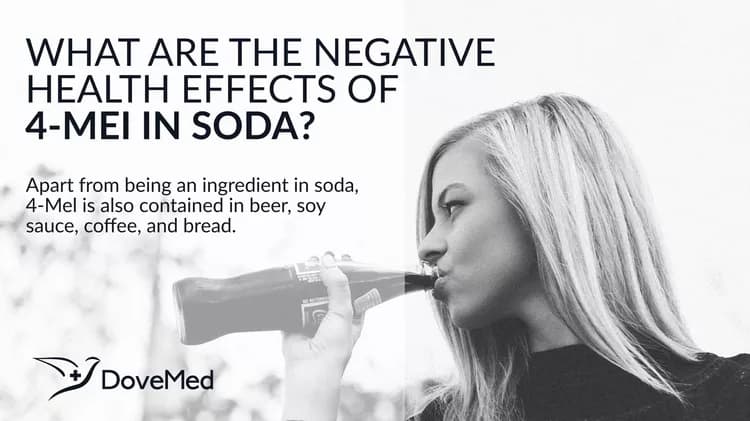4-Mel (or 4-MEI) is an organic chemical compound that is an abbreviated form of 4-Methylimidazole. 4-Mel is contained in the ‘caramel coloring’ that is imparted to many sodas, soft drinks, and other foods, to give them its brownish color. Mintel and Leatherhead Food Research, a market research firm, reports that caramel color is one of the most widely used food coloring in the world (in 2013). 4-Mel is a known animal carcinogen that is also formed as a by-product in certain manufacturing industries such as agricultural chemicals, pharmaceuticals, rubber products, and dyes and pigments. A worker may be occupationally exposed to 4-Mel during the course of their work.
Both the National Toxicology Program (NTP) and the International Agency for Research on Cancer (IARC) lists 4-Mel as “possibly carcinogenic to humans” since it was researched that this synthetic coloring chemical could cause cancer in mice (lung tumors were observed) on long-term exposure. However, 4-Mel is still being used, since the federal government has not prescribed any limits on its usage in foods and beverages. The US Food and Drug Administration (FDA) argues that a person has to consume over 1000 cans of soda to reach a cancer-causing harmful dosage. The FDA also informs that all caramel colorings do not contain 4-Mel (only Class III and Class IV contain the chemical). The American Beverage Association exclaims that there is no scientific evidence to prove that 4-Mel is a threat to humans. However, drinking too much soda is not advised by many healthcare providers, for various other health reasons. For example, the American Heart Association (AHA) advises the public to limit their soda intake to as few as 3 cans per day.
Apart from being an ingredient in soda, 4-Mel is also contained in beer, soy sauce, coffee, and bread. The chemical may also be formed during various food and beverage preparation such as through normal cooking process or even during roasting of meat or coffee beans. High concentrations of 4-Mel are known to be an irritant to the skin, eyes, and the respiratory system; though, such exposure occurs only in the chemical-based industries.
Nonetheless, the California’s Proposition 65 law states that any food product or drinks sold in California with over 29 mg of 4-Mel must contain a label informing consumers of the potential risk of cancer. Due to this, a few of the giant soft drink makers, such as Pepsi and Coke, have now lowered levels of 4-Mel in beverages sold in the state of California. The Center for Science in the Public Interest (CSPI) tested sodas from other nations and found that many contained several times (in between 2 and 10) the limit of 29 mg set per California state law. The CSPI calls for a complete elimination of 4-Mel from colas, since Americans are generally known to drink more sodas than people of other nations. Though, the FDA says that eliminating 4-Mel in foods is virtually impossible!
Additional Resources:
Jacobson MF. Carcinogenicity and regulation of caramel colorings. Int J Occup Environ Health 18(3):254–259. 2012.
CSPI. Petition to Bar the Use of Caramel Colorings Produced with Ammonia and Containing the Carcinogens 2-Methylimidazole and 4-Methylimidazole. Washington, DC:Center for Science in the Public Interest (16 Feb 2011). Available: http://cspinet.org/new/pdf/caramel_coloring_petition.pdf
OEHHA. 4-Methylimidazole (4-MEI) Fact Sheet. Sacramento, CA:Office of Environmental Health Hazard Assessment, California Environmental Protection Agency (updated 10 Feb 2012).
http://ehp.niehs.nih.gov/121-a126/ (accessed on 01/11/2015)
http://consumerreports.org/cro/news/2014/01/caramel-color-the-health-risk-that-may-be-in-your-soda/index.htm (accessed on 01/11/2015)
http://www.fda.gov/food/ingredientspackaginglabeling/foodadditivesingredients/ucm364184.htm (accessed on 01/11/2015)
http://oehha.ca.gov/public_info/facts/4MEIfacts_021012.html (accessed on 01/11/2015)
Helpful Peer-Reviewed Medical Articles:
Chan, P. C., Hills, G. D., Kissling, G. E., & Nyska, A. (2008). Toxicity and carcinogenicity studies of 4-methylimidazole in F344/N rats and B6C3F1 mice. Archives of toxicology, 82(1), 45-53.
National Toxicology Program. (2007). Toxicology and carcinogenesis studies of 4-methylimidazole (Cas No. 822-36-6) in F344/N rats and B6C3F1 mice (feed studies). National Toxicology Program technical report series, (535), 1.
Moretton, C., Crétier, G., Nigay, H., & Rocca, J. L. (2011). Quantification of 4-methylimidazole in class III and IV caramel colors: validation of a new method based on heart-cutting two-dimensional liquid chromatography (LC-LC). Journal of agricultural and food chemistry, 59(8), 3544-3550.
Buckee, G. K., & Bailey, T. P. (1978). EXAMINATION OF SOME BREWING MATERIALS AND CARAMELS FOR THE POSSIBLE OCCURRENCE OF 4‐METHYLIMIDAZOLE. Journal of the Institute of Brewing, 84(3), 158-159.
Lee, K. G., Jang, H., & Shibamoto, T. (2013). Formation of carcinogenic 4 (5)-methylimidazole in caramel model systems: A role of sulphite. Food chemistry, 136(3), 1165-1168.
Related Articles
Test Your Knowledge
Asked by users
Related Centers
Related Specialties
Related Physicians
Related Procedures
Related Resources
Join DoveHubs
and connect with fellow professionals


0 Comments
Please log in to post a comment.